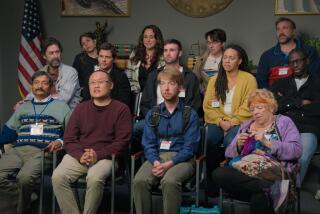Jury-Duty Excuses: You Be the Judge
The flaw in the court system, someone once observed, is that your fate is in the hands of 12 people who weren’t smart enough to get out of jury duty.
But sometimes it isn’t for lack of trying.
Heard the one about the woman who owned a female poodle and was afraid to leave it alone in her apartment? She feared the dog would somehow escape--and the man who lived upstairs from her owned an ordinary male mutt.
Judy Rivituso has heard that one, plus countless other creative excuses from citizens seeking to be excused from having to sit in a jury box.
No Fines Accepted
“I remember one guy asking if he could buy his way out,” said Rivituso, jury program coordinator, assignments, for Superior Court of Los Angeles County. “He wanted to know if he could pay $250, like a fine, rather than be on a jury. No way.”
Eventually, whichever county you reside in, the odds are that--if you are a registered voter or a registered vehicle owner--a computer will randomly select your name. You haven’t won a prize, unless you consider $5 a day as such. Rather, you are being considered to sit in judgment in a courtroom.
This year, the master jury file for Los Angeles County was drawn up in June with a total of 1.3 million names, according to Juanita Blankenship, assistant director of the Office of Jury Commissioners for Los Angeles County. The figure represents a 36% increase over the previous fiscal year.
And requests for exemptions are expected to keep pace.
According to the juror affidavit that must be completed and mailed within 10 days, a person is competent to act as a juror if he or she is a U.S. citizen, is 18 or older, possesses sufficient knowledge of the English language, and is “in possession of his or her natural faculties and of ordinary intelligence.”
There is space on the affidavit for a recipient to say thanks, but no thanks, with explanation.
Mary Fitten, jury program coordinator, qualifications, for Superior Court of Los Angeles County, recalled one explanation:
“I am one who has lost all my hair and need a full wig. I can not be in an enclosed room for any length of time due to extreme heat caused by wearing the hair piece.”
And another:
“My heart has stopped (sic) and my age is not conducive to the work required.”
Plants Need Attention
And:
“I have many plants that I possess as a hobby that require much attention and care . . . water regularly.”
Also, Fitten said, the spellings in the explanations are sometimes creative:
“I have a contract in one of my eyes which will require surgery in the near future.”
Or:
“I have closter foufeca.”
Sometimes, according to Fitten, the explanations seeking excuses are elaborate, such as:
“I am a 68-year-old retired man taking care of an 86-year-old lady who wishes to marry me.
“She has stumbled into a gopher hole feeding her chickens and does not walk very well. But her health and outlook on life have greatly improved since I began taking care of her and her chickens.”
How could you argue with an explanation such as that? The man was excused.
In San Diego County, Gerry Stevens, coordinator of jury services, recalled some of the gems among the many replies she has received on the affidavits:
A man wrote: “I would be most happy to serve, but you will first have to make arrangements for my release from jail.”
Stevens’ favorite came from a young man who wrote that he was a struggling student, had a part-time job, was behind in his bills and was due to be married in three weeks:
“If I have to serve as a juror at this point in time, I would be compelled to drop all my classes, declare bankruptcy and lose a perfectly good relationship.”
In Orange County, Evelyn Valle holds forth in Santa Ana as jury services supervisor. She recalled a reply from a man who wrote that he couldn’t serve at that time because his wife was dying. “However,” he added, “in October, when she is dead, I’ll be available.”
One man, in the space allowed for explanation, simply wrote: “None of your business.”
Lucky for him it was in writing, rather than while standing in front of Emma Goss.
Once summoned to court, an oral attempt at being excused is permitted. In Downey Municipal Court, the 74-year-old Goss said she is known as the Little General because she has little patience with those who seek to evade their civic duty without good cause.
A Sub-Par Excuse
Goss, deputy clerk there, said she wasted no time in giving a quick answer to a man who wanted out because, he said, spending time serving on a jury would interfere with his golf.
“One guy,” she said, “asked to be excused because he said he likes to sleep late on mornings.”
With Fitten, as is the case with all who have such responsibility, legitimate requests are allowed--such as citing the financial burden of having to spend time on jury duty, disability that would risk harm to one’s health, obligation to provide care to dependents between 8 a.m. and 5 p.m. daily.
“I supervise a staff of eight jury interviewers who review everything received,” Fitten said. “They have guidelines on which to base their decisions as to whether a person is qualified or should be excused.
“If the person meets minimum competency and offers no legal grounds for being excused, he or she may be summoned for duty anytime within three weeks to one year.” In an instance of no news being good news, no response is sent out when an excuse is allowed, Fitten said.
Once a Year
Having served within the previous 12 months is legitimate grounds for not having to do so again right now.
Raymond Arce, director of Office of Jury Commissioners for Los Angeles, said about 30% of those who respond are excused (some mail is returned by the Postal Service as undeliverable). In addition to the legitimate reasons already mentioned, another one comes under the heading of jeopardizing protection of public health and safety.
“Because of the shortage of nurses, we are seeing and granting a lot of requests from them,” he said.
The most common request to be excused, Arce said, involves extreme financial burden, followed closely by medical reasons.
“We get a good cross-section of the community now,” he said. “There once was a myth that the typical jurors were homemakers or retirees. Actually, a juror is just as likely to be employed on a job and be between the ages of 35 and 55.”
But hardly a day goes by without attempts to be spared the honor. Stevens of San Diego County recalled a reply from a woman whose husband had received a notice.
Her husband, she wrote, “has had a stroke and has to spend 24 hours a day in bed with a nurse.”
More to Read
Sign up for Essential California
The most important California stories and recommendations in your inbox every morning.
You may occasionally receive promotional content from the Los Angeles Times.










